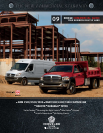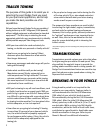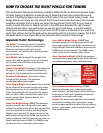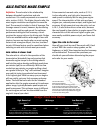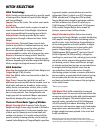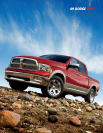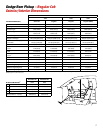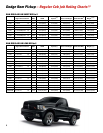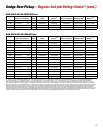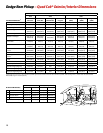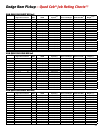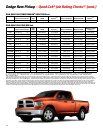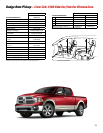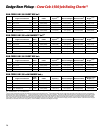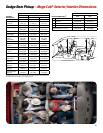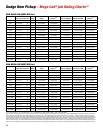
3
HOW TO CHOOSE THE RIGHT VEHICLE FOR TOWING
Ram and Dakota Pickups and Durango and Nitro SUVs all offer an extremely diverse range
of trailer towing capabilities. A wide variety of powertrain/axle ratio combinations and
optional trailering packages assure the perfect vehicle for your trailer towing needs. Your
Dodge Retailer can show you the various Trailer Tow Groups and other Heavy-Duty Groups
available on Dodge Trucks to help you select the equipment that’s right for your towing
needs. Careful attention to details up front is the difference between the right towing
vehicle and one that is not quite what you need to get the job done – a situation which
could prove extremely dangerous on the road. The first step is to familiarize yourself with
terms that will be used in this guide when discussing vehicle choices for towing. You’ll find
the guide easier to use if you take a few moments and review this terminology.
Important Trailer Terminology:
Tow Rating: The maximum amount of weight a
vehicle can tow, as rated by the manufacturer.
Maximum tow limits usually have special
requirements, such as axle ratio, cooling systems,
types of hitches, etc.
Curb Weight: (vehicle weight) The weight of the
empty truck (without payload or driver), including
fuel, coolant, oil and all items of standard or
optional equipment.
Loaded Trailer Weight: The weight of the trailer plus
all cargo in it. Measure Loaded Trailer Weight by
putting the fully loaded trailer on a vehicle scale.
Maximum Trailer Weight: Term used on charts
throughout this brochure. The maximum
permissible loaded trailer weight.
Trailer Tongue Weight: The downward force exerted
on the hitch ball by the trailer coupler with weight
distributing devices, if any, deactivated. Measure
Trailer Tongue Weight with the trailer fully loaded
and on a level surface, and with the coupler at its
normal towing height. Measure directly with
a commercial scale.
Gross Axle Weight Rating: (GAWR) The maximum
weight a specific axle is designed to carry safely.
Includes the weight of the vehicle plus any load that
must be supported by the axle, including Tongue
Weight and/or payload. The load on front and rear
axles should not exceed the GAWR specied on the
safety certification label for front and rear axles, nor
should total load exceed GVWR. The GAWR can be
found on the driver’s side door panel sticker.
Gross Vehicle Weight Rating: (GVWR) Total
allowable weight of a fully equipped vehicle with
driver, passenger(s), cargo, fluids, accessories and
Tongue Weight. Maximum GVWR and front and rear
GAWRs must not be exceeded. The GVWR can be
found on the driver’s side door pillar sticker.
Gross Combination Weight: (GCW) A fully equipped
vehicle with driver, passenger(s), fuel, fluids, standard
and optional equipment, and a trailer with cargo.
Gross Combination Weight Rating: (GCWR)
Maximum allowable gross combination weight,
which includes a fully equipped vehicle with driver,
passenger(s), fuel, fluids, standard and optional
equipment, and a trailer with cargo.
Payload: The amount of weight that can be carried
by a vehicle including driver, passengers, cargo
and the tongue weight of a trailer, plus any options,
factory or aftermarket, and the weight of any upfit
body modifications.
GROSS VEHICLE
WEIGHT OF
TOWING VEHICLE
+
GROSS VEHICLE
WEIGHT OF TRAILER
=
GROSS COMBINATION
WEIGHT
2006 vehicle shown.



